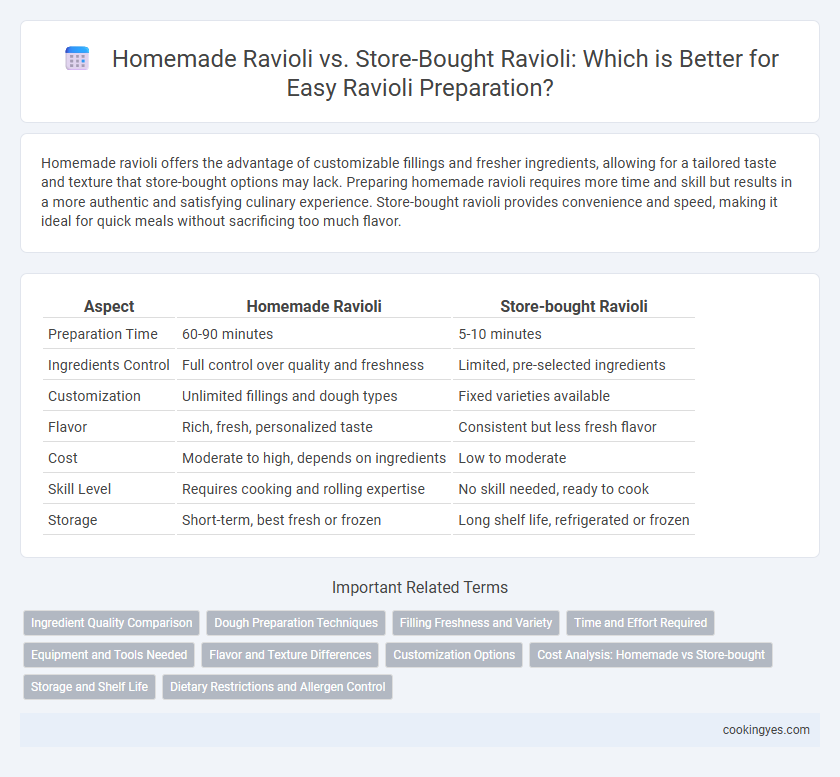Homemade ravioli offers the advantage of customizable fillings and fresher ingredients, allowing for a tailored taste and texture that store-bought options may lack. Preparing homemade ravioli requires more time and skill but results in a more authentic and satisfying culinary experience. Store-bought ravioli provides convenience and speed, making it ideal for quick meals without sacrificing too much flavor.
Table of Comparison
| Aspect | Homemade Ravioli | Store-bought Ravioli |
|---|---|---|
| Preparation Time | 60-90 minutes | 5-10 minutes |
| Ingredients Control | Full control over quality and freshness | Limited, pre-selected ingredients |
| Customization | Unlimited fillings and dough types | Fixed varieties available |
| Flavor | Rich, fresh, personalized taste | Consistent but less fresh flavor |
| Cost | Moderate to high, depends on ingredients | Low to moderate |
| Skill Level | Requires cooking and rolling expertise | No skill needed, ready to cook |
| Storage | Short-term, best fresh or frozen | Long shelf life, refrigerated or frozen |
Ingredient Quality Comparison
Homemade ravioli typically features fresher, high-quality ingredients like organic flour, farm-fresh eggs, and artisanal fillings, offering richer flavors and better texture compared to store-bought varieties. Store-bought ravioli often contains preservatives, stabilizers, and lower-grade ingredients to extend shelf life and reduce costs, potentially compromising taste and nutritional value. Prioritizing ingredient quality in homemade ravioli enhances the overall dining experience with more authentic and customizable flavors.
Dough Preparation Techniques
Homemade ravioli dough requires precise ingredient ratios and thorough kneading to achieve the ideal elasticity and thinness, often involving rest periods to relax the gluten. Store-bought ravioli dough is pre-made, usually with additives to enhance shelf life and texture, reducing the need for advanced dough preparation skills. Mastering homemade dough techniques allows for customization in thickness and flavor, resulting in a superior texture compared to the uniform consistency of commercial products.
Filling Freshness and Variety
Homemade ravioli offers superior filling freshness due to the use of garden-fresh ingredients and customizable combinations like ricotta with spinach or mushroom and thyme, which significantly enhance flavor profiles. Store-bought ravioli provides convenience and consistent quality but often contains preservatives that reduce filling freshness and limit variety to standard options such as cheese or meat. Choosing homemade ravioli ensures maximum control over ingredient freshness and creative filling variety, essential for a personalized culinary experience.
Time and Effort Required
Homemade ravioli demands significant time and effort, including preparing fresh pasta dough, rolling it out, and filling each piece carefully, which can take several hours depending on skill level. Store-bought ravioli offers convenience, drastically reducing preparation time to just minutes, as it comes pre-made and often pre-cooked, requiring only reheating or quick boiling. For busy schedules, store-bought ravioli provides a practical option, while homemade ravioli rewards patience with customizable fillings and fresher taste.
Equipment and Tools Needed
Homemade ravioli preparation requires specialized equipment such as a pasta roller or rolling pin, a ravioli mold or cutter, and a sharp knife for precise shaping and sealing. In contrast, store-bought ravioli eliminates the need for these tools, allowing for quicker meal preparation with just basic kitchen utensils like a pot for boiling and a strainer. The investment in tools for homemade ravioli ensures control over dough thickness and filling distribution, enhancing overall quality and texture.
Flavor and Texture Differences
Homemade ravioli offers superior flavor and texture due to fresh ingredients and customizable fillings, which result in a richer, more complex taste and a tender yet firm bite. Store-bought ravioli often lacks depth in flavor and can have a mushy texture from preservatives and mass production processes. The artisanal technique used in homemade preparation enhances the dough's elasticity and filling's quality, creating a distinctly satisfying culinary experience.
Customization Options
Homemade ravioli offers extensive customization options, allowing control over dough thickness, filling ingredients, and seasoning to suit personal taste and dietary preferences. Store-bought ravioli, while convenient, typically provides limited variety and standardized flavors, restricting creativity in preparation. Customizing homemade ravioli enables the incorporation of fresh, seasonal ingredients and experimental fillings that are not available in commercial products.
Cost Analysis: Homemade vs Store-bought
Homemade ravioli typically involves higher upfront costs due to purchasing fresh ingredients like flour, eggs, and fillings but offers greater control over quality and portion sizes, which can reduce waste and cost per serving over time. Store-bought ravioli provides convenience and lower immediate expenses since it is mass-produced and packaged, but often includes preservatives and lower-quality ingredients that may affect taste and nutritional value. Carefully comparing ingredient prices, preparation time, and frequency of consumption helps determine the most cost-effective choice between homemade and store-bought ravioli.
Storage and Shelf Life
Homemade ravioli typically requires refrigeration and can last up to 2-3 days when stored in an airtight container, while freezing extends its shelf life to about 1-2 months without compromising texture. Store-bought ravioli often includes preservatives, enabling a longer refrigerated shelf life of about 1 week, with frozen varieties lasting up to 6 months. Proper storage in moisture-proof packaging is essential to maintain flavor and prevent freezer burn for both homemade and commercial ravioli.
Dietary Restrictions and Allergen Control
Homemade ravioli allows precise control over ingredients, making it ideal for managing dietary restrictions such as gluten intolerance, dairy allergies, or vegan preferences by customizing fillings and dough. Store-bought ravioli often contains common allergens like eggs, wheat, and dairy, and may risk cross-contamination in mass production facilities. Preparing ravioli at home ensures strict allergen control, reducing the risk of exposure and accommodating specific nutritional needs more effectively.
Homemade ravioli vs Store-bought ravioli for preparation Infographic

 cookingyes.com
cookingyes.com